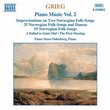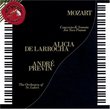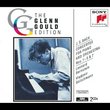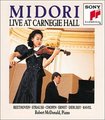| All Artists: Vladimir Sofronitsky, Chopin, Scriabin Title: Great Pianists 91 Members Wishing: 2 Total Copies: 0 Label: Philips Release Date: 5/11/1999 Genres: Dance & Electronic, Classical Styles: Ballets & Dances, Dances, Chamber Music, Forms & Genres, Sonatas, Historical Periods, Classical (c.1770-1830), Modern, 20th, & 21st Century, Instruments, Keyboard Number of Discs: 2 SwapaCD Credits: 2 UPC: 028945697024 |
Search - Vladimir Sofronitsky, Chopin, Scriabin :: Great Pianists 91
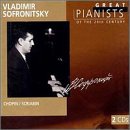 | Vladimir Sofronitsky, Chopin, Scriabin Great Pianists 91 Genres: Dance & Electronic, Classical
|
Larger Image |
CD DetailsSimilarly Requested CDs
|
CD ReviewsA legend lampros | 08/06/2000 (5 out of 5 stars) "Talking about Sofronitsky is talking about a legend almost unknown in the west. Richter called him a God, and Gilels said he was the best among pianists. According Gavrilov, Richter and Gilels were nothing compared to Sofronitsky. For me, Nikolayeva and Sofronitsky are the most spiritual and poetic russian pianists of this century, more metaphisical Tatyana, more romantic Sofronitsky. Chopin and Scriabin were two of his most beloved composers ( i especially regret the lack of Schumann on these cds since Vladimir was at his best playing Schumann). I wasn't a Scriabin fan until i knew Sofronitsky . His presentation of Scriabin is far from those of Richter and Horowitz. Sofronitsky understands Scriabin in a very romantic way, almost byronian, and he makes clear all the nightmares and horror that exists in that music. Sometimes it sounds like the music of solitude, sometimes like in Vers la Flame yoyu can feel the mephistophelic smell, all the dumb dangers of the romantics.I'm just guessing but i think our pianist was a solipsist and you Scriabin was also a solipsistic. Ok, i agree all this is very subjectiv. What it's not subjectiv at all, is the beauty of the sound, full of armonics, the extraordinary pianissimi, the personal use of the rubato, and the steamy quality of his romantic performance. A must for any piano or Scriabin-lover" Scriabin! Scriabin! Scriabin! lampros | 03/22/2000 (5 out of 5 stars) "There is very little to say about music such as this. This is what music is all about; stepping beyond ordinary thoughts and saying in tone what cannot be said in words. In Sofronitsky, Scriabin had the greatest gift a composer could ask for. A performer who transforms your creation into a language ALL can understand, and translates in such a way as to create a statement so definitive, that other performances immediately pale in comparison. If you've ever had the slightest inclination toward the torrid, claustraphobic world of Scriabin, heres the place to begin. And end." A deeply disturbing genius Rupert Stone | Timbucktoo | 01/08/2000 (5 out of 5 stars) "One can judge the nature of Sofronitsky's pianism purely by the photographs in the illuminating essays prefacing these recordings: his frame hangs wearily from his shoulders, his ubiquitous cigarette trembles nervously in his fingers, and his eyes gaze out from the page as if tortured by the wiles of Beelzebub. No frivolities for him: his Chopin waltzes are convulsed in irony and bitterness at the superficiality of modern life, and his mazurkas dance as if possessed with grief. The Nocturnes Op. 27 are here recorded with an emotional intensity that Pollini, Lipatti, Solomon and Rubinstein could never have dared conceive; the reading of the Barcarolle is a similar benchmark, although somewhat more euphoric. The same applies for Sofronitsky's early Scriabin, which is placed firmly in the Russo-Romantic tradition: the Fourth Sonata's second movement has a practically Horowitzian clangour. What is particularly disturbing about Sofronitsky's genius, however, is its total identification with Scriabin's later work. In the Black Mass Sonata, for instance, he fills the music with macabre idiosyncracy so convincing that one wonders whether Scriabin would have re-written the sonata having heard his performance. The jewel in this dark crown, however, must be Vers la flamme, which Sofronitsky transforms into a monument to the inner hell of art. All credit to Philips for creating a rare opportunity to delve into the world of this mystical giant."
|

 Track Listings (18) - Disc #1
Track Listings (18) - Disc #1


